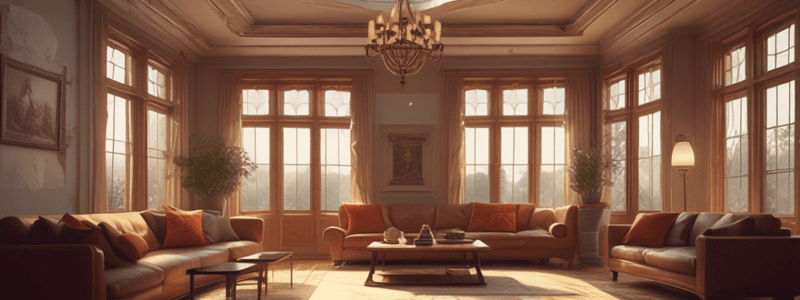Podcast
Questions and Answers
What is the primary purpose of general lighting in a space?
What is the primary purpose of general lighting in a space?
- To uniformly brighten an entire room (correct)
- To influence color perception
- To provide visibility for specific tasks
- To draw attention to artwork or features
Which type of lighting is specifically used for activities like reading or working?
Which type of lighting is specifically used for activities like reading or working?
- Accent Lighting
- General Lighting
- Task Lighting (correct)
- Natural Lighting
What distinguishes accent lighting from other types of lighting?
What distinguishes accent lighting from other types of lighting?
- It uses the same amount of light as surrounding areas.
- It draws focus to specific features by increasing light concentration. (correct)
- It is primarily derived from natural sunlight.
- It provides ambient light for the entire room.
Why is natural sunlight considered challenging to control in interior design?
Why is natural sunlight considered challenging to control in interior design?
What type of fixtures are commonly used for task lighting?
What type of fixtures are commonly used for task lighting?
How does lighting influence our perception of color?
How does lighting influence our perception of color?
Which of the following lighting types can be achieved using spotlights?
Which of the following lighting types can be achieved using spotlights?
What is a common source for general lighting within a room?
What is a common source for general lighting within a room?
What type of lighting is known to enhance blues and greens while muting warmer colors?
What type of lighting is known to enhance blues and greens while muting warmer colors?
What color of lampshades is recommended for maximizing light dispersion?
What color of lampshades is recommended for maximizing light dispersion?
Which direction do rooms typically receive cooler, indirect sunlight?
Which direction do rooms typically receive cooler, indirect sunlight?
What is one of the main benefits of LED bulbs compared to traditional incandescent bulbs?
What is one of the main benefits of LED bulbs compared to traditional incandescent bulbs?
What type of lighting mimics the progression of sunlight to improve well-being and sleep patterns?
What type of lighting mimics the progression of sunlight to improve well-being and sleep patterns?
What does sophisticated lighting schemes allow for in a space?
What does sophisticated lighting schemes allow for in a space?
Which light source is said to have a brighter and whiter output compared to standard incandescent lighting?
Which light source is said to have a brighter and whiter output compared to standard incandescent lighting?
What aspect of a room significantly influences how colors are perceived?
What aspect of a room significantly influences how colors are perceived?
What is a key feature of smart lighting systems?
What is a key feature of smart lighting systems?
Which type of light sources can create a cozy atmosphere in a living room?
Which type of light sources can create a cozy atmosphere in a living room?
Flashcards are hidden until you start studying
Study Notes
Functions of Lighting
- Lighting provides visibility and significantly affects the room's ambiance.
- Contrasting examples: candlelit rooms create intimacy, while spotlight-heavy spaces feel vibrant and energetic.
Types of Artificial Lighting
-
General Lighting (Ambient Lighting):
- Offers uniform brightness throughout a room.
- Achieved through wall or ceiling fixtures, and large lamps.
- Examples include chandeliers, track lights, and floor lamps.
-
Task Lighting:
- Designed for specific activities like reading or studying.
- Provides focused illumination, typically from small lamps or track lighting.
-
Accent Lighting:
- Highlights particular features or objects, such as artwork.
- Uses three times the light on the focal point compared to the surroundings.
- Commonly implemented through spotlights.
Color and Light Interaction
- Light greatly influences color perception.
- Different light sources affect color appearances:
- Warm light from incandescent bulbs enhances yellows and reds.
- Halogen bulbs emit brighter, whiter light.
- Fluorescent bulbs emit cool blue light, amplifying blues and greens.
- New "soft white" fluorescent bulbs aim to replicate incandescent warmth.
Fixture Color and Room Orientation
- Light fixture colors influence room ambiance:
- Colored glass and warm-toned lampshades can create distinctive glows.
- Deeply colored shades absorb light, while white or cream shades maximize dispersion.
- Room orientation affects natural light quality:
- North-facing rooms receive cooler, indirect light.
- South-facing rooms benefit from warmer sunlight.
- Traditionally, warm colors are favored in north-facing spaces and cool colors in south-facing areas, but creative variations are welcome.
Material Reflection and Perception
- Reflective properties of surfaces affect color perception:
- Glossy surfaces reflect light, appearing brighter; textured materials absorb more light, resulting in subdued color effects.
Smart Lighting Systems
- Enable remote control of lighting settings for comfort and efficiency.
- Can integrate sensors that adjust lighting based on natural light levels.
- Promote energy efficiency with advanced LED technology, reducing heat emission and increasing lifespan.
Sophisticated Lighting Schemes
- Combining ambient, task, and accent lighting creates adaptability in spaces.
- Tailored lighting can enhance mood, such as warm ambient lighting in living areas or focused task lighting in workspaces.
Chronobiological Lighting
- Mimics natural light progression, adjusting color and intensity throughout the day.
- Promotes well-being by aligning with the body's circadian rhythms, enhancing alertness and aiding relaxation/sleep.
Outdoor Lighting
- Enhances curb appeal and safety for outdoor areas.
- Strategically placed lighting improves visibility, highlights architecture, and enhances landscaping.
- Extends outdoor usability for evening events and security by deterring intruders.
Studying That Suits You
Use AI to generate personalized quizzes and flashcards to suit your learning preferences.




